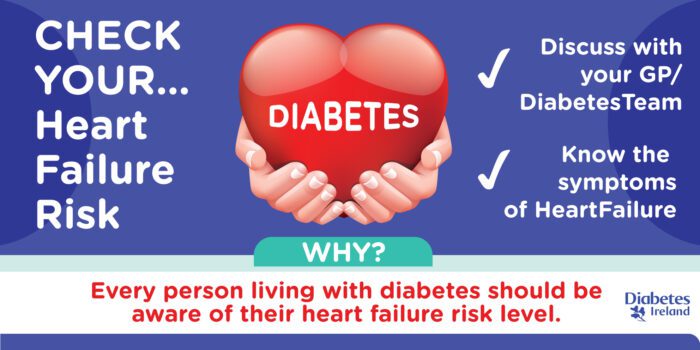Diabetes Ireland has launched a new campaign encouraging people with diabetes to be more proactive in taking steps to prevent or delay the onset of heart failure.
Diabetes is one of the primary causes of heart failure and people living with diabetes need to be mindful that heart failure can be a major complication of diabetes. For people living with Type 1 and Type 2 diabetes, the prevalence of heart failure is two to four times higher than in the general population.
Diabetes Ireland CEO, Kieran O’Leary said “The reason we are launching this campaign is because the HSE is making a simple blood test, the B-type Natriuretic Peptide (NTproBNP) test, more widely available for those considered at high risk of heart failure including people living with diabetes. We believe that every adult living with diabetes should be aware of how to reduce their risk of heart failure.”
The introduction of the blood test resulted from the STOP-Heart Failure research study undertaken at St. Vincent’s Hospital in Dublin to see if people with risk factors for heart failure could have their risk defined by the use of the B-Type Natriuretic Peptide (NTproBNP) test. The study was shown to reduce not just heart failure but all cardiovascular events by 40% in high-risk patients. Building on the success of this study and the well-established Midlands Diabetes Scheme, the STOP-HF Midlands project targeted the local diabetes population and showed that despite excellent risk factor control, 3 in 10 people with diabetes had evidence of significant problems with heart function.
The campaign is to make people with diabetes aware of the availability of the test and to encourage them to request the test from their GP or Diabetes team if they have any concerns about their risk of heart failure. The campaign also aims to raise more awareness of the symptoms of heart failure among the diabetes community and to encourage them to reduce their risk of heart failure by moving to a healthier lifestyle.
For further information on the symptoms and risk factors of heart failure and on ways to reduce your risk of heart failure (click here). “I would urge people with diabetes to visit our information page and educate themselves on the symptoms of heart failure, diabetes risk factors for heart failure and most importantly see how they can take action to reduce their risk of developing heart failure” added Mr O’Leary
The campaign is supported by an educational grant from Roche and AstraZeneca.
The campaign is also supported by Croí.

